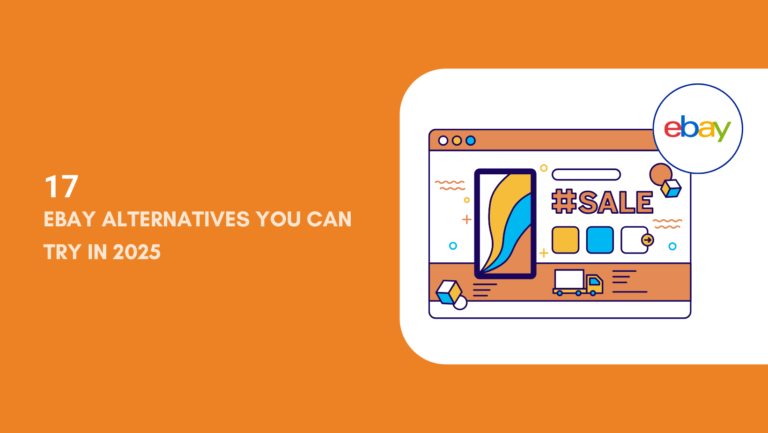Founded in 1995, eBay is one of the oldest eCommerce marketplaces on the internet.
Even after more than two decades, the site is going strong with over 159 million buyers.
While eBay is still popularly used, a large number of its sellers have started to explore other options.
The main reason behind that is the platforms’ buyer-biased policies and high fees.
Fortunately, plenty of options are available nowadays for those who want to jump ships.
In this article, we’ll go over a list of the best eBay alternatives, their pros, and cons, as well as the key features.
So let’s dive straight into it!
1) Etsy
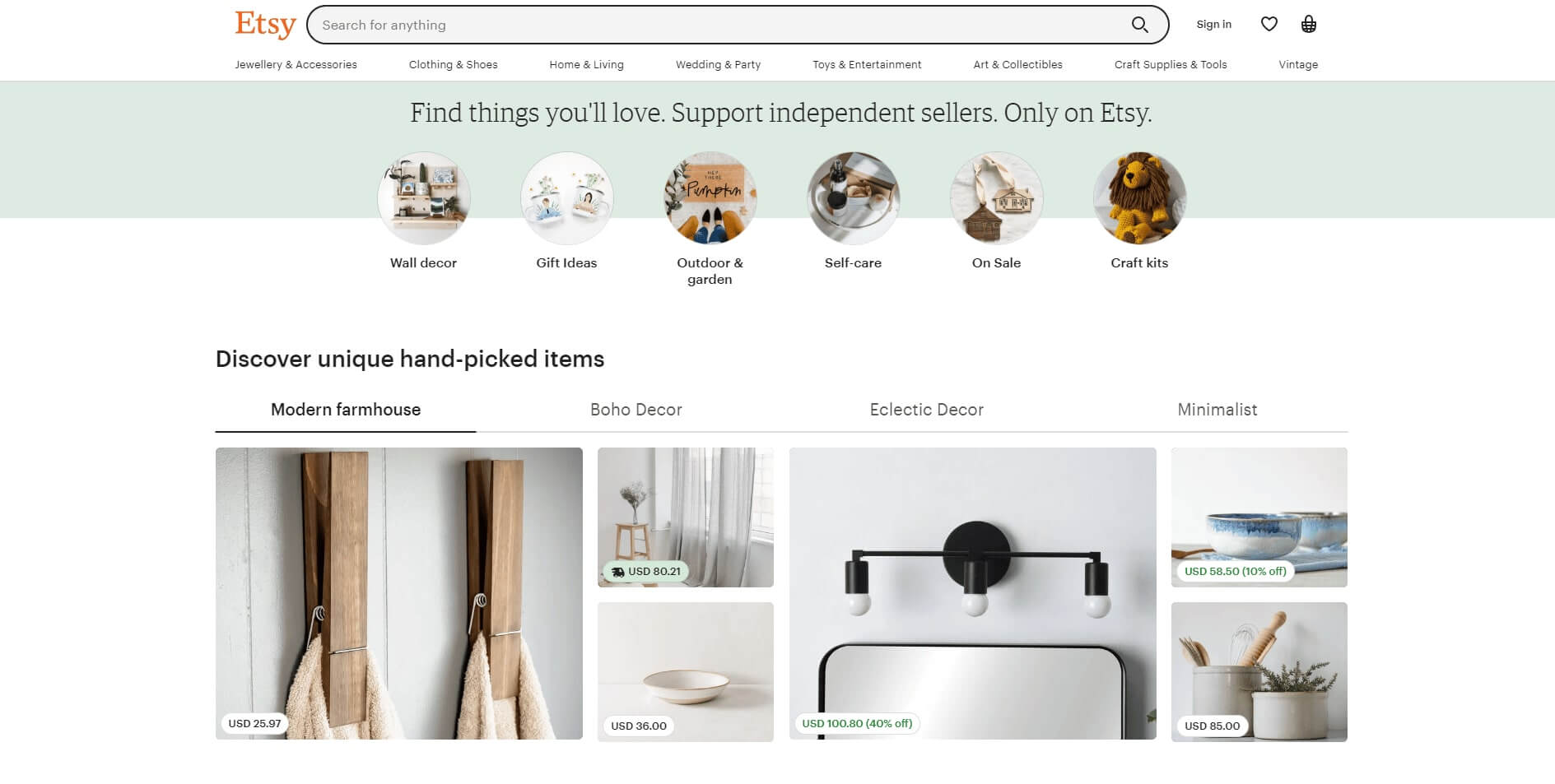
Etsy is the best eBay alternative for those who want to sell vintage, custom, unique or handmade goods.
Similar to eBay, Etsy is also considered to be a C2C site because the majority of the sellers on the platform are solo craftsmen.
Over the years, Etsy has gained a huge user base of more than 90 million buyers.
Jewelry, home décor, and gifts are some of the most commonly sold products on the site.
Etsy is also quite similar to eBay in terms of its listing fee.
You’re charged $0.20 for every product you add to your listings, plus 6.5% of the product price on each sale.
Etsy is the perfect platform for those who want to start a small business and turn their past times into a source of income.
But if you’re looking for scalability, then you would have to search elsewhere because the product restrictions and fee structure of the platform aren’t suitable for larger businesses.
Pros
- Huge customer base
- Less competition
- High profit margin for handmade products
- No signup fee
Cons
- Etsy charges a 6.5% transaction fee on sales, which can increase overall costs.
- You can only sell a limited category of products.
- Sellers have less flexibility in customizing their storefront compared to independent websites.
- With so many sellers on the platform, standing out can be challenging.
Key Features
- Focus on handmade, vintage, and custom products.
- User-friendly setup process for new sellers.
- Built-in marketing tools and SEO resources.
- Strong community support and engagement.
- Access to a large, targeted audience looking for unique items.
Best For
Etsy is best suited for artisans, crafters, and small business owners who create or curate unique products. It appeals to those targeting niche markets that appreciate handmade or vintage goods, making it ideal for creative entrepreneurs looking to reach customers who value originality.
Pricing
Etsy’s pricing structure includes:
- Setup Fee: $15 one-time fee to open a shop.
- Listing Fee: $0.20 per item listed (renewed every four months).
- Transaction Fee: 6.5% of the total sale price (including shipping).
In comparison, eBay charges a final value fee that typically ranges from 10% to 12%, depending on the category of the product sold. While both platforms have fees, Etsy’s focus on niche markets can provide sellers with opportunities for higher profit margins on unique items.
2) Amazon
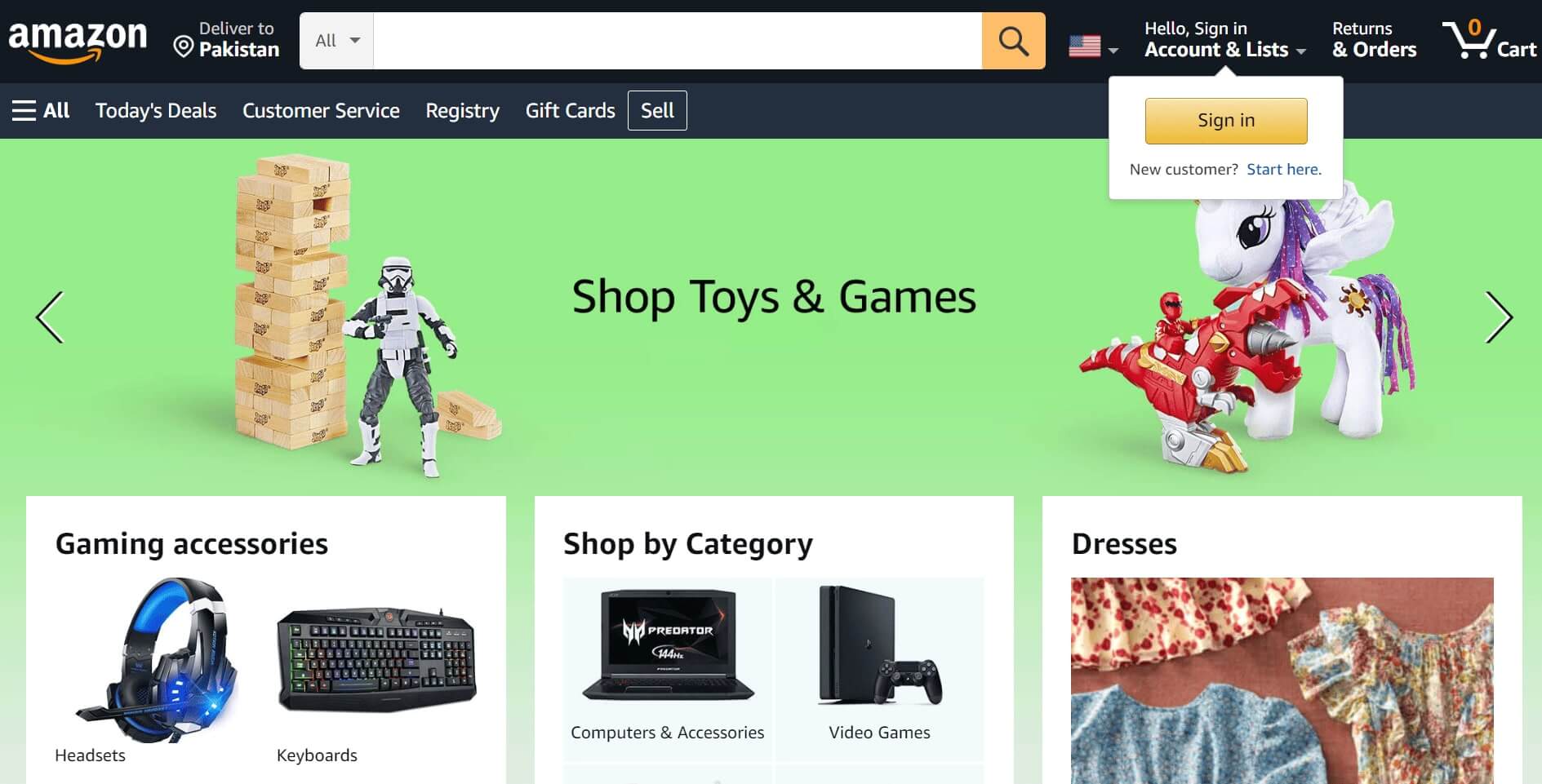
You aren’t probably a stranger to Amazon. After all, it’s the largest eCommerce marketplace in the world.
From hair pins to furniture, you can find pretty much anything on the platform.
The wide range of products on Amazon attracts more than 197 million buyers each month.
Not only is Amazon a great eBay alternative but also one of its biggest competitors.
Although before you transition to Amazon, keep in mind that the site has fierce competition.
You might have a hard time getting sales at the beginning, and will have to make active marketing efforts.
Amazon doesn’t charge a listing fee, although you do have to pay commissions depending on the type of product.
Lastly, Amazon also provides warehousing and fulfillment services if you opt for its FBA program.
Pros
- Largest eCommerce marketplace in the world
- Easy to scale and internationally expand
- No listing fees
- Potential to build a big brand through private labeling
- Low marketing costs due to the huge user base
Cons
- Competition is tough.
- You cannot access customer data.
Key Features
- Amazon FBA helps you easily pack and ship products.
- Free 2-day shipping with Amazon Prime
- The FBA program also handles customer service.
- Advanced marketing tools for optimizing product visibility.
- Global reach with multiple international marketplaces.
Best For
Amazon is ideal for established brands and new sellers looking to tap into a large, diverse customer base. It works well for businesses that can meet competitive pricing demands and those that want to leverage Amazon’s fulfillment services to enhance customer satisfaction.
Pricing
Amazon’s pricing structure includes:
- Individual Selling Plan: No monthly fee, but charges $0.99 per item sold.
- Professional Selling Plan: Monthly subscription fee of $39.99, with no per-item fee but higher referral fees based on product category.
Amazon’s extensive reach and fulfillment options can justify the higher costs for many sellers looking for growth opportunities.
3) eBid
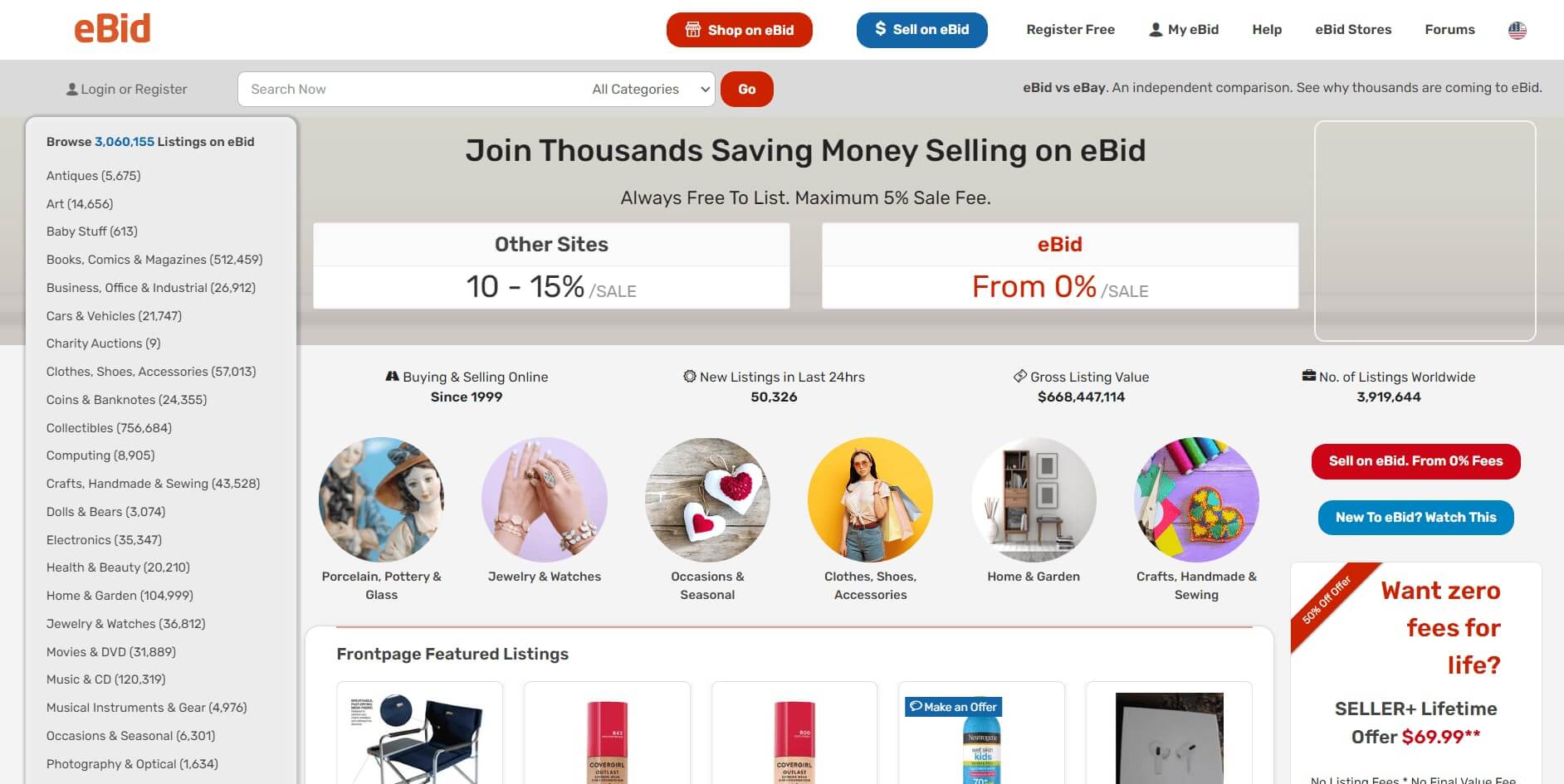
eBid is probably one of the closest alternatives to eBay you’ll find on this list.
As its name suggests, it is also an auction platform where you can sell a vast variety of items.
You don’t need to have a listing fee on eBid; the commission is only 3% per sale.
And if you purchase the annual Seller+ subscription for $64.99, then you don’t need to pay any commission at all.
Everything about eBid seems perfect, so shouldn’t you start selling on the platform?
Well, the problem is its small user base. While eBid is a great platform, we only suggest using it once you’ve learned how to successfully market a business.
Pros
The biggest benefit of eBid is that it’s a low-risk platform so it can also be used for product testing.
- Low commission of only 3% per sale
- Wide range of product categories
- Unexplored by most sellers
- Low-risk market
Cons
- eBid has significantly less traffic compared to eBay, averaging around 8 million visits per month, which can limit visibility.
- The user experience can vary, with some users reporting issues with navigation and customer service.
Key Features
- Auction-style format like eBay
- Low-risk makes it great for product testing
- Final value fees capped at 3%, significantly lower than eBay’s fees.
- Seller+ subscription eliminates listing fees.
Best For
eBid is best suited for budget-conscious sellers who want to avoid high fees associated with larger platforms like eBay. It appeals to both casual sellers and professional merchants looking for a straightforward selling experience without the burden of listing costs.
Pricing
eBid’s pricing structure includes:
- Free Membership: No cost to list items under standard seller accounts.
- Seller Plus Membership: A paid subscription option for professional merchants, available for a one-time fee of approximately £99.99 or discounted rates within 24 hours of joining.
eBid offers a more affordable option for sellers, the trade-off is its lower traffic volume, which may affect sales opportunities.
4) Craigslist
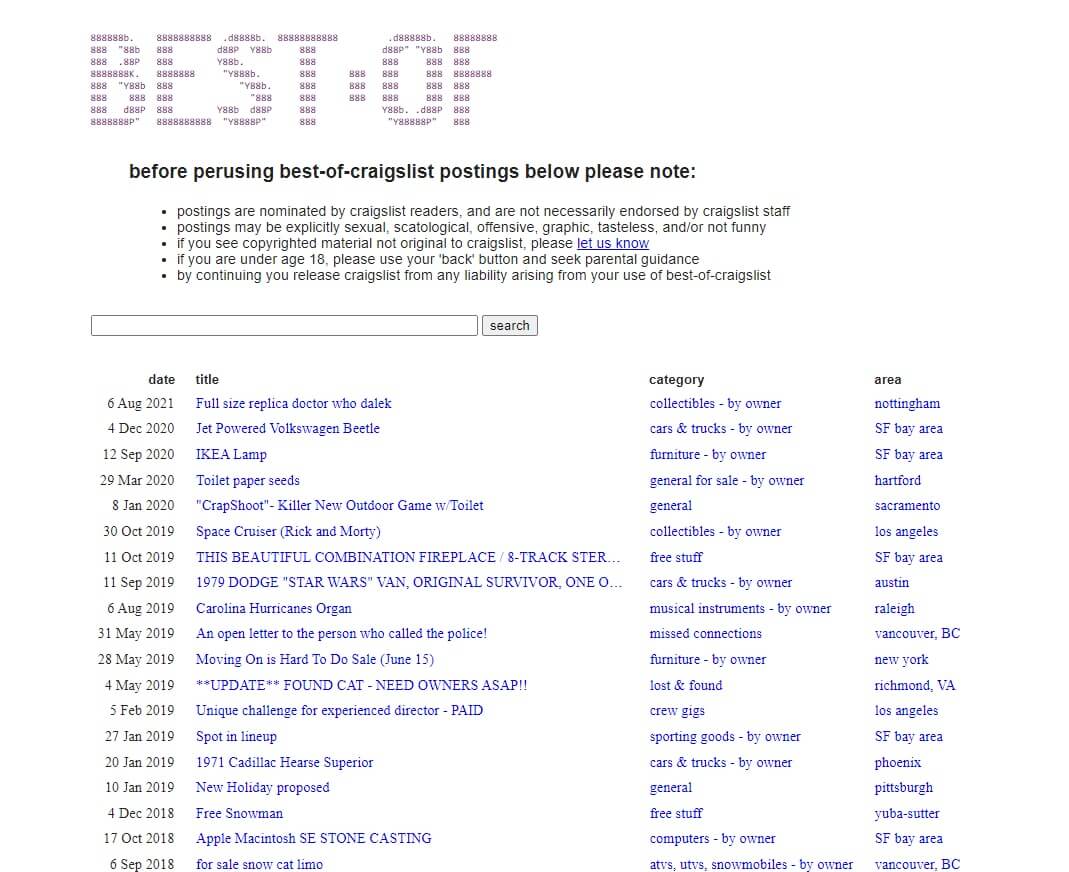
Some of you have probably heard about Craigslist from back in the day.
The platform is still pretty much alive, and although technically a forum, Craigslist is still a decent alternative to eBay.
No commissions or fee is charged for selling products on Craigslist because it isn’t an eCommerce platform.
But as great as this sounds, the biggest drawback of the site is that it doesn’t offer dispute resolution services.
It’s a seller’s environment riddled with scammers who are looking to make easy money.
Pros
- No commissions or transaction fee
- You can sell any product.
- Covers more than 70 countries
- Great for selling vintage items
Cons
- No dispute management service
- Scams are common on the site.
- You can only sell locally.
- No shipping networks or warehouses
Key Features
- Free to list most items for sale, with minimal fees for certain categories.
- Localized selling, allowing for face-to-face transactions.
- Simple and straightforward listing process with no complex setup.
- Wide variety of categories for different types of goods and services.
- High monthly traffic, providing exposure to a large audience.
Best For
Craigslist is best suited for individuals looking to sell items locally without incurring listing fees. It appeals to those who prefer quick sales and direct interactions with buyers, making it ideal for selling furniture, electronics, vehicles, and other large or hard-to-ship items.
Pricing
Craigslist does not charge fees for most listings. However, there are specific fees for certain categories, such as job postings in major cities (e.g., $25 for job ads in New York and Los Angeles).
5) Newegg
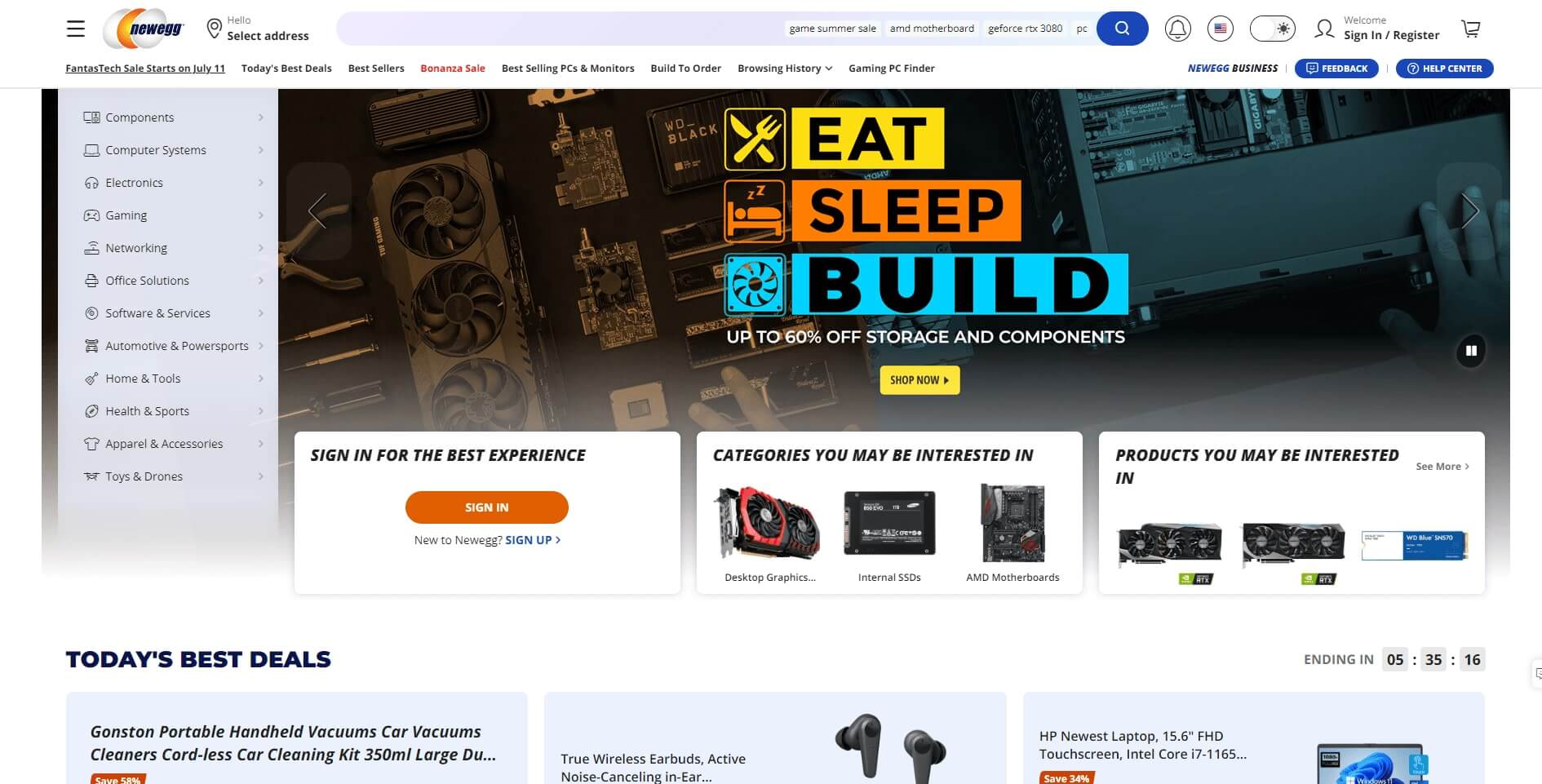
We know this site has a funny-sounding name, but it is a great platform for tech-focused products.
Most items sold on Newegg are computer parts, electronics, and gaming equipment.
This site attracts a tech-savvy audience aged 18-45 so you can easily target a specific group of customers.
Although based in California, Newegg provides distribution facilities across the United States and Canada.
The platform is available in more than 50 countries with over 4.2 million active users.
We know, this doesn’t sound much in comparison to eBay but don’t forget that Newegg targets a niche market.
Newegg also offers a fulfillment service similar to Amazon FBA to make shipping hassle-free. Otherwise, you can also get the assistance of a third-party logistics service to deliver your orders.
They have 3 subscription programs and the commission they charge is usually between 8 to 15%.
Pros
- You can target the tech market.
- Available in more than 50 countries
- Distribution centers in the United States and Canada
Cons
- 8 to 15% commission rate
- Only for tech-focused products
- The customer base is still small.
Key Features
- Strong focus on electronics and tech-related products.
- Best deals section on the site to sort discounted products
- Fulfillment service similar to the Amazon FBA program
- Provides SEO guide to help you improve listings
- Multi-channel selling opportunities, including B2B options.
Best For
Newegg is best suited for sellers of electronic products and tech-related items. It appeals to businesses targeting tech enthusiasts, gamers, and consumers looking for reliable electronics. Additionally, the platform is ideal for sellers who want to leverage fulfillment services to improve efficiency.
Pricing
Newegg’s pricing structure includes:
- Final Value Fees: Typically between 10% and 15%, depending on the product category.
- Fulfillment Fees: Lower than competitors like Amazon, with claims of being 5% lower for pick and pack fees.
In comparison, eBay charges 10% to 12% final value fee, both are quite similar but Newegg might be a better choice for store owners focusing on electronic products.
6) Bonanza
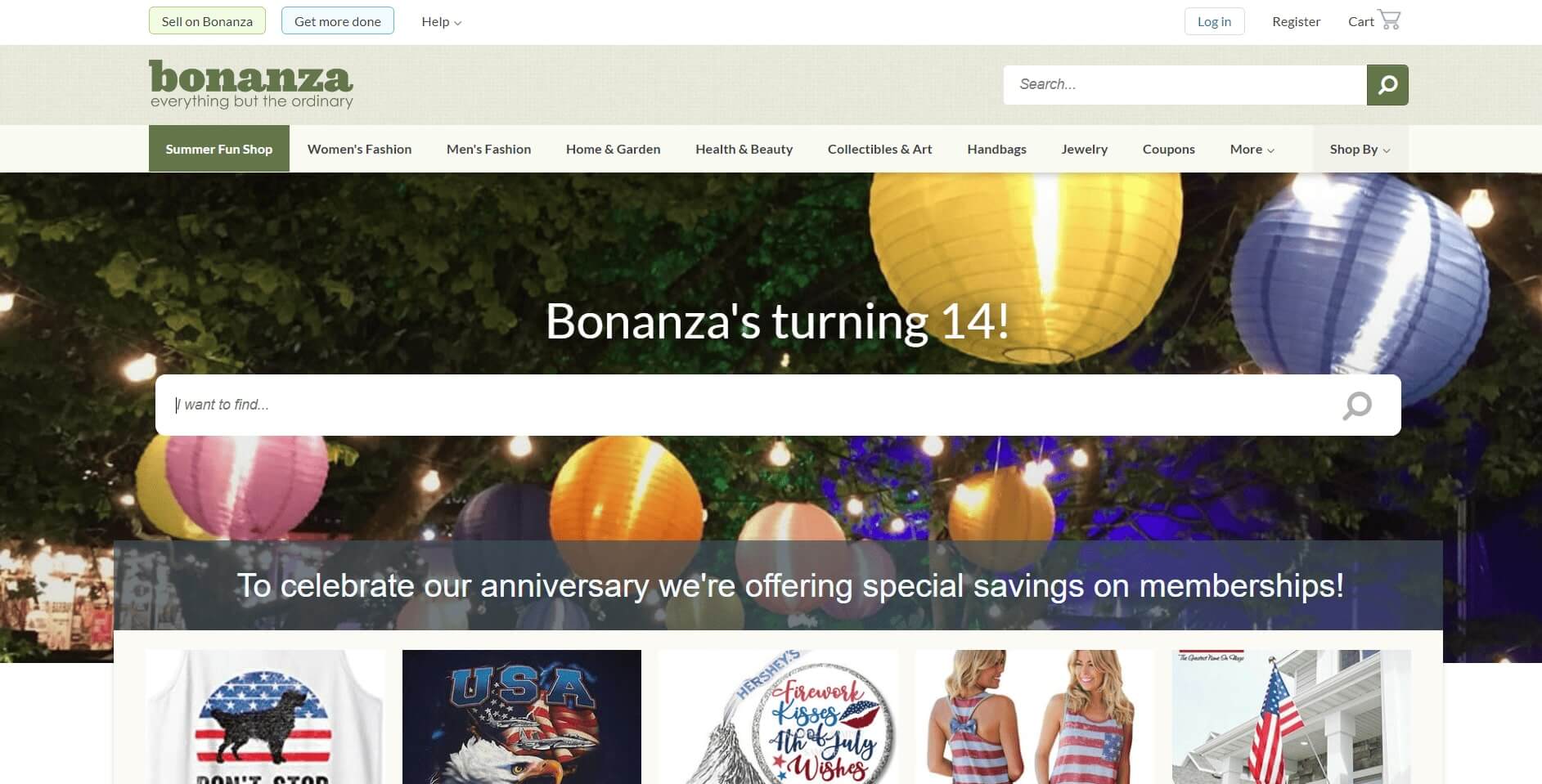
Bonanza is less popular and one of the newer eCommerce sites on this list.
However, the platform has been quickly gaining traction for the offbeat and unique items you can find on the site. Even their tagline says “where you can find everything but the ordinary”.
From colorful shoes to handcrafted jewelry, you’ll see a vast variety of products on Bonanza.
And if you feel skeptical about trusting them then they’ve also secured a high online rating on Trustpilot.
The only fee Bonanza charges is a 3.5% cut for sales under $500 which lowers down to 1.5% once the amount crosses $500.
A key feature of Bonanza is that you can share a percentage of your revenue with the platform to improve advertisements and rank higher on the search.
Pros
- A wide variety of unique and offbeat products
- Seller-friendly platform
- No charges to add listings
- The final value fee is capped at just 3.5%
Cons
- Mainly targets unique items
- Small customer base leading to lower traffic
Key Features
- Share a percentage of your revenue for additional advertising and rank higher in the listings.
- The 3.5% transaction fee is decreased to 1.5% after the amount crosses $500.
- Easy integration with existing eCommerce sites like eBay and Amazon.
- Customizable storefronts that allow sellers to showcase their brand.
Best For
Bonanza is best suited for small businesses and individual sellers looking for a cost-effective alternative to larger marketplaces. It appeals to those who want more control over their branding and selling experience while reaching a diverse audience interested in unique and varied products.
Pricing
Bonanza’s pricing structure includes:
- No Listing Fees: Sellers can list items without incurring any upfront costs.
- Final Value Fee: A capped fee of 3.5% on each sale, which is significantly lower than eBay’s typical final value fee of 10% to 12%.
While Bonanza offers a cost-effective solution for sellers, the trade-off is its lower traffic volume compared to larger competitors. However, its unique features and seller-friendly policies make it an attractive option for small businesses looking to grow their online presence.
7) Ruby Lane
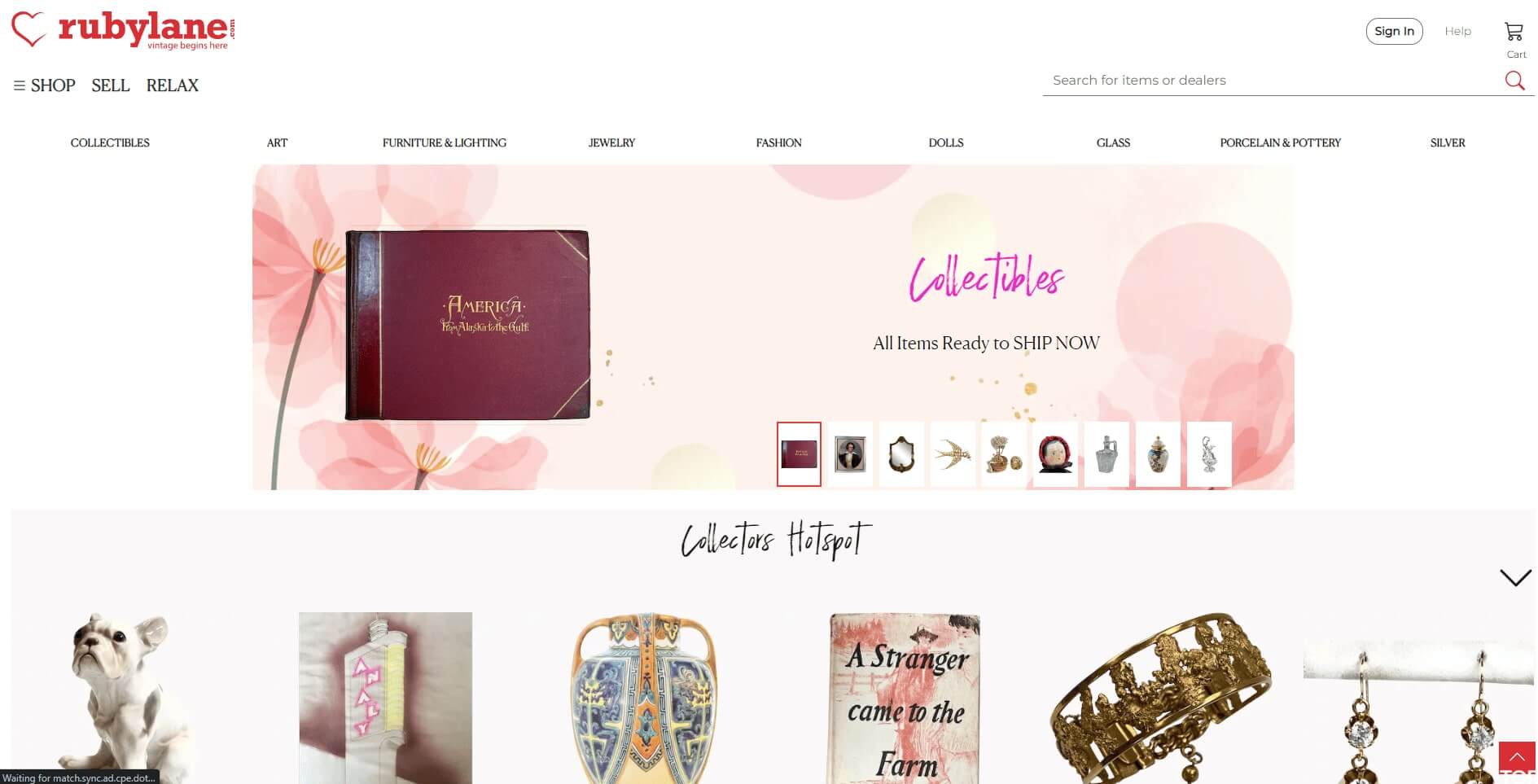
Ruby Lane primarily focuses on selling rare and vintage goods like arts, antiques, collectibles, and jewelry.
And while you don’t have to pay a commission fee, the site charges a listing fee as well as a monthly maintenance fee, along with one-time setup charges.
We know, this sounds a bit complicated and you’re probably thinking that it isn’t worth it.
But the biggest selling point of Ruby Lane is that it attracts collectors who are often willing to purchase high-ticket products that you might not even be able to sell on eBay.
Pros
- You don’t have to pay commissions.
- Great platform for selling high-ticket products
- Perfect for selling jewelry and other fashion collectibles
- Decent global reach and user base
Cons
- Requires consistent engagement from sellers to maintain visibility and sales.
- A monthly maintenance fee of $25, although it can be waived by listing at least 15 items.
Key Features
- Exclusively focuses on antiques, vintage collectibles, and artisan goods.
- Curated marketplace with stringent vetting processes for sellers.
- No setup or listing fees, making it accessible for new sellers.
- Monthly maintenance fee that can be waived by listing a minimum number of items.
Best For
Ruby Lane is best suited for sellers of vintage and antique items who want to reach a niche market. It appeals to those looking for a platform that values quality over quantity, making it ideal for artisans, collectors, and small businesses focused on high-end or unique products.
Pricing
Ruby Lane’s pricing structure includes:
- No Setup or Listing Fees: Sellers can create their shops without initial costs.
- Service Fee: A 9.9% fee on the final sale price (excluding sales tax), capped at $250 per item.
- Monthly Maintenance Fee: $25, which can be waived if at least 15 items are listed during the month.
8) eCrater
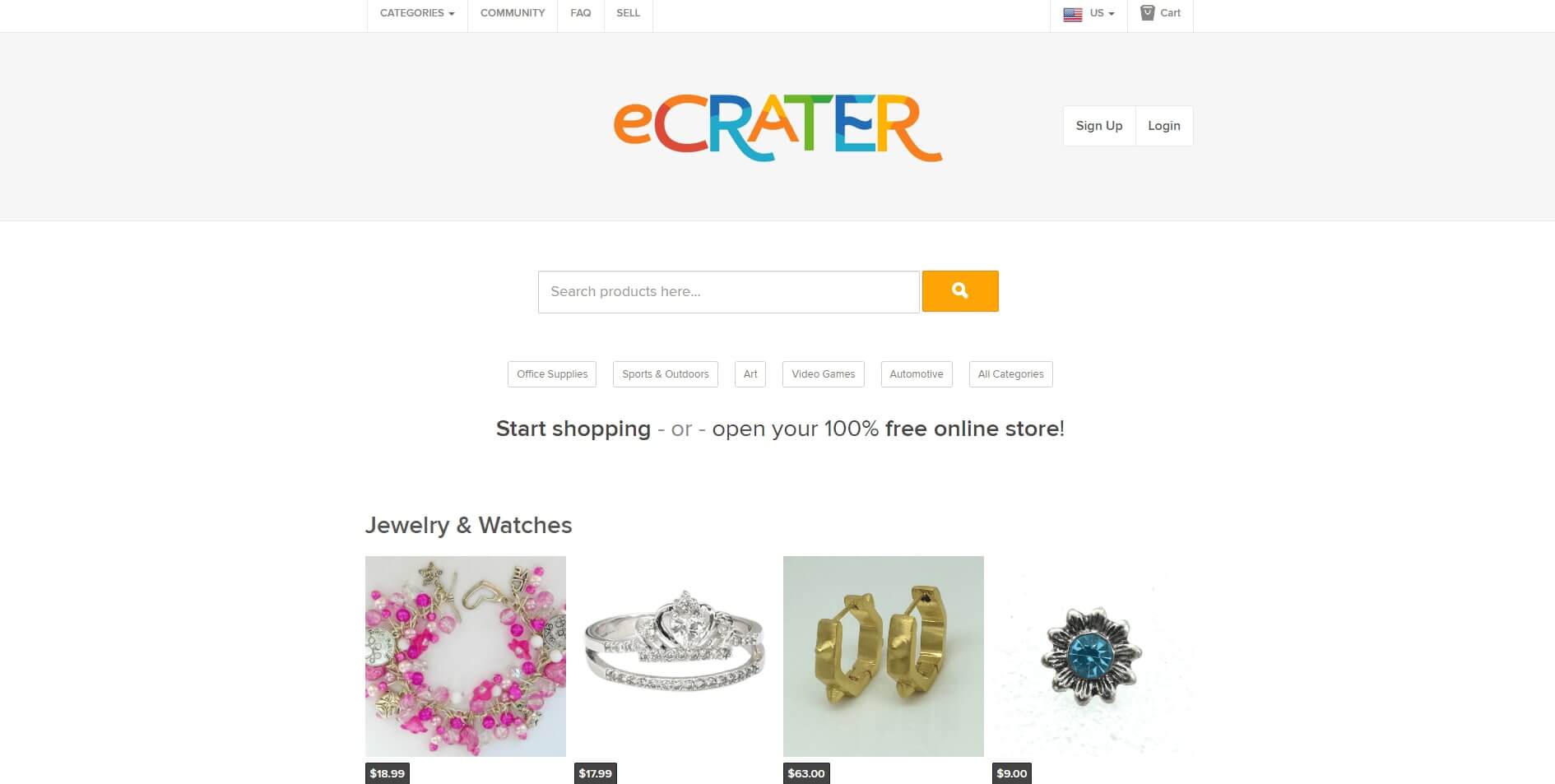
If you don’t want to invest a lot of money in your online business then eCrater is a viable eBay alternative.
It’s pretty similar to traditional eCommerce sites where you can sell everything you want at your desired prices.
It’s free to set up an account on eCrater and the cherry on top is that they only charge a 2.9% commission.
You can also choose from a variety of templates to create an attractive storefront.
And to make things easier, you can import your eBay listings to eCrater to migrate in no time!
The traffic you get on your eCrater store mainly depends on your marketing efforts, so this is a department where you’ll have to work harder.
Pros
- Sellers can create a personalized online store without any setup fees.
- There are no commission fees if sales are generated independently by the seller.
- The platform allows bulk importing of eBay listings, simplifying the transition for existing sellers.
Cons
- Limited traffic compared to larger marketplaces like eBay or Amazon, which may affect sales volume.
- Some features, such as custom domains, come with additional monthly fees (around $5/month).
- Sellers must ship products within the U.S. to be eligible to sell on the platform.
Key Features
- Tons of readymade templates available
- The marketplace is 100% free to use.
- You can import your eBay listings to eCrater.
- Supports multiple payment options, including PayPal and Stripe
Best For
eCrater is best suited for small businesses and individual sellers looking for an affordable way to establish an online presence. It appeals to those who want control over their branding and product presentation while reaching a diverse audience without incurring high fees.
Pricing
eCrater’s pricing structure includes:
- No Listing Fees: Sellers can list products for free.
- Final Value Fees: Only applicable if sales occur through the marketplace; otherwise, sellers keep 100% of their earnings.
- Custom Domain Fee: Approximately $5/month for a personalized domain name.
- Premium Store Template Fee: Available for about $10/month, enhancing the store’s appearance.
While eCrater offers a more cost-effective solution for sellers, its lower traffic volume may require additional marketing efforts to drive sales.
9) Walmart
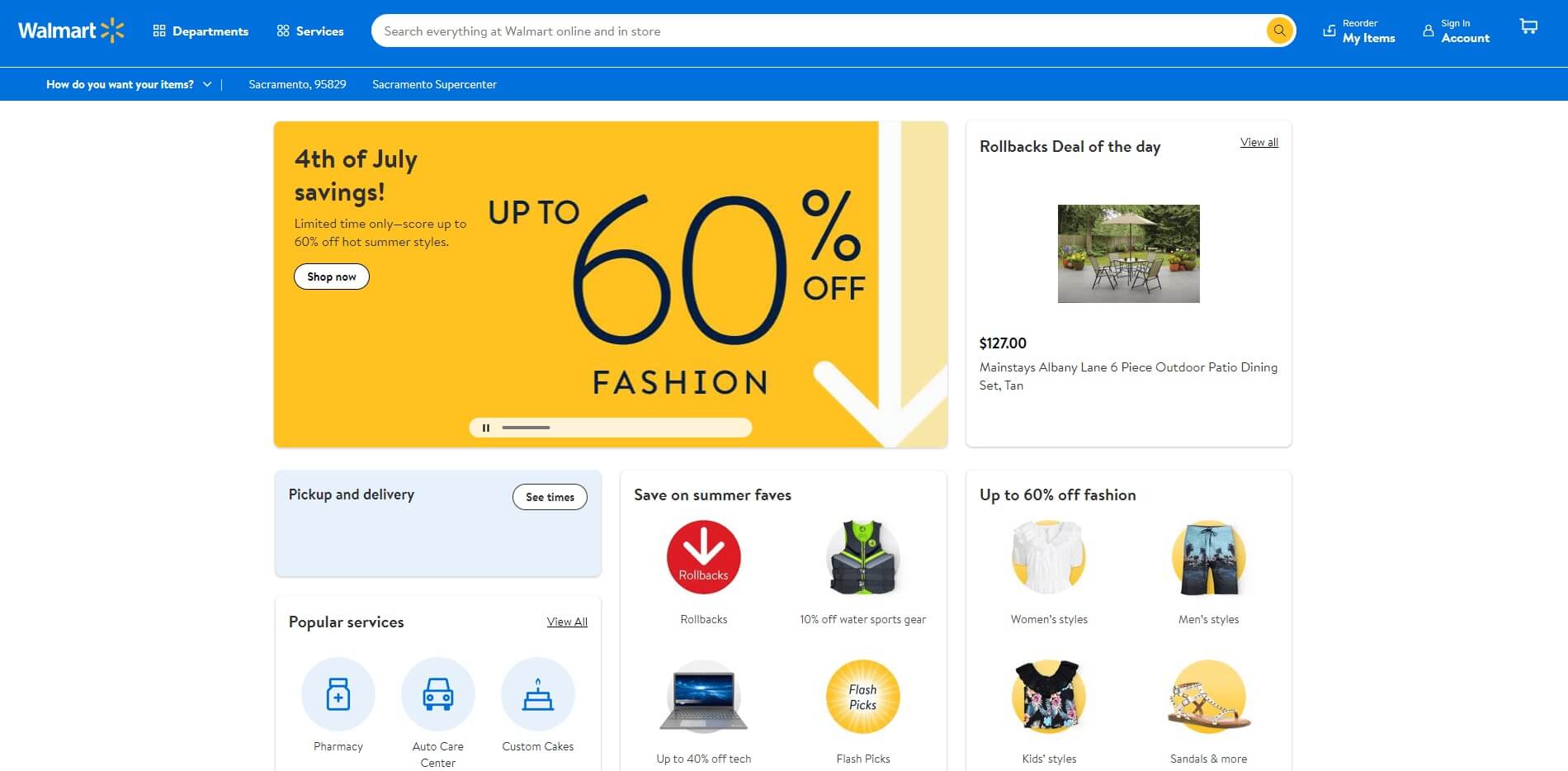
Walmart is one of the most reputable retail corporations in the U.S with sales projected to reach $112 billion by 2027. Not only that, but Walmart also has a huge audience with more than 120 million users per month.
It’s to say that Walmart offers a ton of money-making potential, especially once you learn how to navigate the platform.
The only drawback of the site is that they have a strict onboarding process. But that’s to make sure quality is maintained on the site.
Unlike eBay, Walmart doesn’t charge an insertion fee. You only have to pay an 8-20% cut after a successful transaction.
Walmart doesn’t have too many restrictions and you’re allowed to sell most products.
But bear in mind that the competition on the platform might be a bit tough.
Pros
- Sell a vast selection of products
- Limited fees and commissions
- Large customer base
Cons
- Competition with Walmart’s in-store products
- Only fixed-price listings are allowed.
Key Features
- Massive audience reach with millions of monthly visitors.
- Fulfillment by Walmart (FBW) option for streamlined logistics and customer service.
- Competitive seller programs that enhance product visibility.
- Advanced analytics and reporting tools for tracking sales performance.
- Seamless integration with existing eCommerce platforms.
Best For
Walmart Marketplace is best suited for established brands and small to medium-sized businesses looking to expand their online presence. It appeals to sellers who can meet competitive pricing demands and those who want to leverage Walmart’s fulfillment services to enhance customer satisfaction.
Pricing
Walmart Marketplace’s pricing structure includes:
- Referral Fees: Typically around 15%, depending on the product category.
- Fulfillment Fees: Similar to Amazon’s FBA, costs vary based on size and weight but are generally competitive.
10) Rakuten
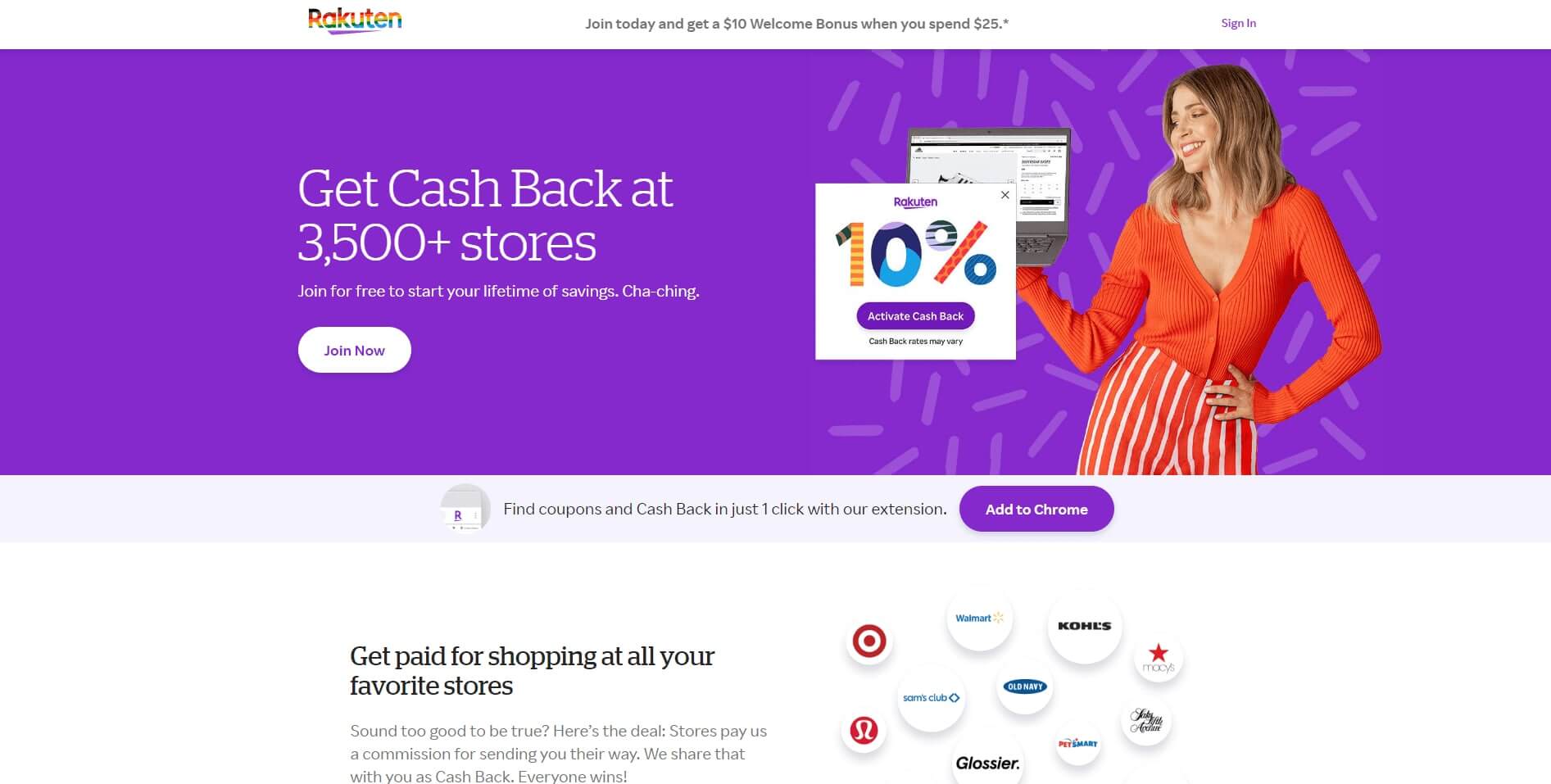
Most people don’t know this but Rakuten is one of the most popular eCommerces sites in Japan. Some even refer to it as the “Amazon of Japan”.
It’s the go-to shopping platform for more than 40% of Japanese shoppers.
Rakuten offers plenty of shop customization features including tools to design your store, quick edits to products, and a blog to help you improve marketing.
The platform is trusted by famous brands from all over the world like Dell, Lenovo, Depot, and more.
One drawback of Rakuten is its high fee as they charge a $33/month maintenance to the sellers along with other commissions.
But if you’re planning to target an Eastern market and can afford the fee, then Rakuten can be a fantastic eBay alternative.
Pros
- Operates in at least 29 countries
- Sell in a variety of product categories
- Best platform to target the Eastern and Japanese market
- Lesser competition in comparison to eBay
Cons
- The application process can be lengthy and requires thorough documentation for approval.
- Higher competition within the platform may make it challenging for new sellers to gain traction.
- Sellers are responsible for their own customer service and inventory management, which can be demanding.
Key Features
- Extensive product range with over 142 million items available.
- Customizable storefronts that allow sellers to control their brand presentation.
- Comprehensive support through bilingual eCommerce Consultants (ECCs).
- Rakuten Super Points loyalty program that encourages repeat purchases.
- Cross-border selling capabilities, enabling international merchants to reach Japanese consumers.
Best For
Rakuten is best suited for sellers looking to enter the Japanese market or those specializing in unique and diverse products. It appeals to both small businesses and larger brands seeking to leverage Rakuten’s strong market presence and customer loyalty programs.
Pricing
Rakuten’s pricing structure includes:
- Monthly Fees: Varies based on the seller’s plan, typically starting around $50/month.
- Transaction Fees: Generally around 5%, depending on the product category sold.
11) Zibbet
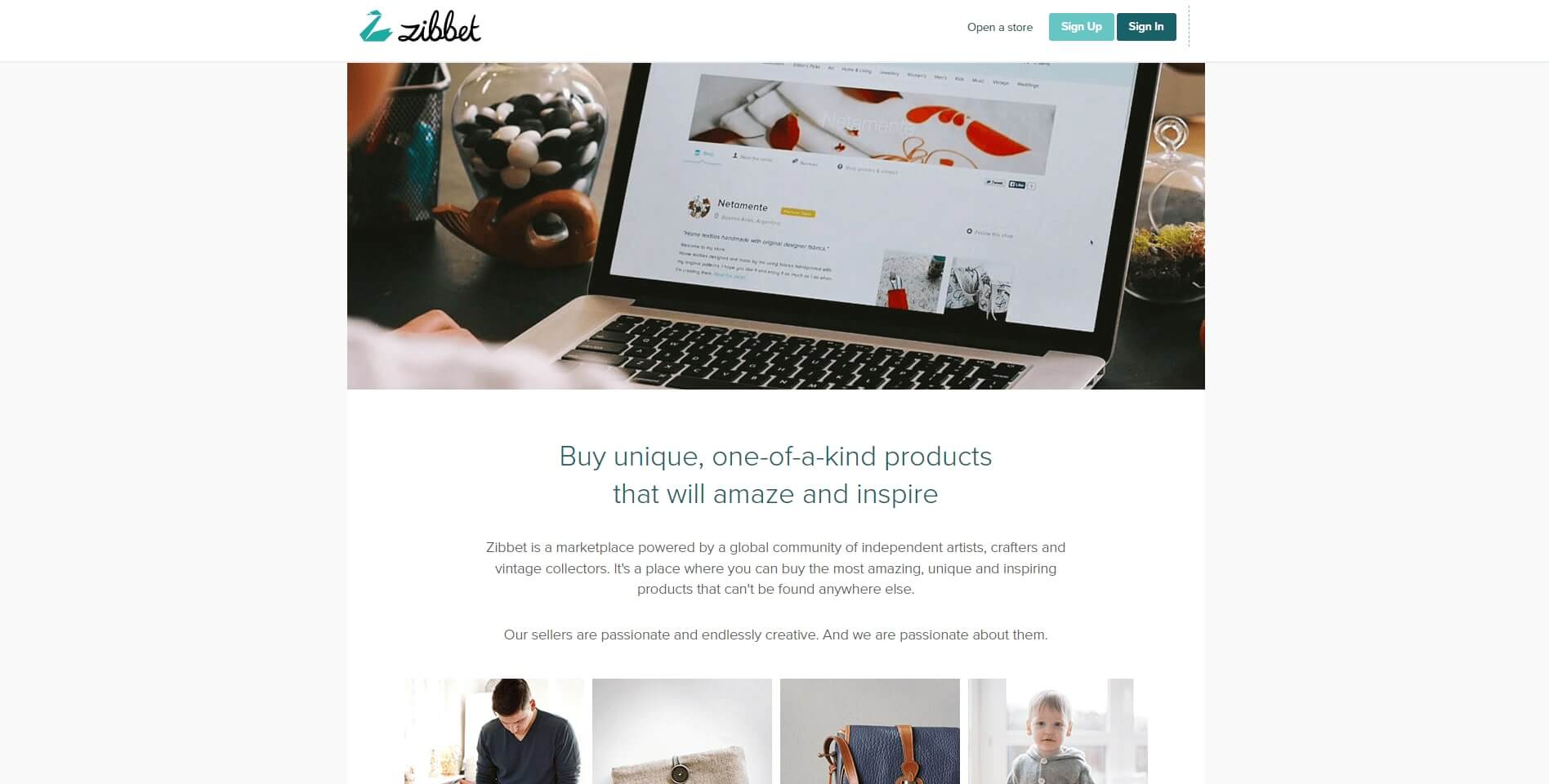
Zibbet is another platform that is famous for specializing in handmade products. It’s more of an Etsy alternative, but eBay users with a creative spark can also use it.
The free plan of Zibbet allows merchants to sell up to 10 products per month. Any more than that and you would have to purchase their subscription which starts at $5.
Another drawback of the free plan is that sellers can only add one image to their listings, which makes it almost useless from a marketing standpoint.
Zibbet’s Ultimate Plan allows merchants to create promos and discount coupons for their buyers. Moreover, it also opens access to advanced analytics and premium themes to customize the store.
The platform supports multichannel selling and can be connected to popular social media platforms like Facebook and Instagram.
Pros
- Sell up to 10 items without paying any fee.
- Premium themes on Unlimited Plan
- Create coupons and discounts for buyers.
Cons
- Platform still lacks traffic.
- Only cashout method is PayPal.
Key Features
- Unified dashboard for managing products and sales across multiple channels.
- Real-time inventory management to prevent overselling.
- No listing or transaction fees on the Zibbet Marketplace.
- Customizable storefronts that enhance brand presentation.
- Support for digital downloads, allowing sellers to offer instant access to digital products.
Best For
Zibbet is best suited for artisans and crafters who want to sell unique handmade items without the burden of listing fees. It appeals to those who operate across multiple platforms and need a centralized tool to manage their sales efficiently. The platform is particularly beneficial for sellers of digital products and vintage items.
Pricing
Zibbet’s pricing structure includes:
- Free Membership: Allows up to 50 items listed with no fees.
- Paid Memberships:
- Standard Plan: $12.95/month for up to 250 products and 10 photos per product.
- Pro Plan: $14.95/month for up to 500 products and 20 photos per product.
- Plus Plan: $19.95/month for unlimited products and photos.
New users can also test the platform with a 14-Day Free Trial before committing.
12) Mercari

Founded in 2013, Mercari is another competent eBay alternative that only operates in the U.K, U.S, and Japan.
The majority of the user base of Mercari is from Japan but it has also managed to generate significant traffic from other countries.
More than 100,000 products are added to the platform daily including video games, phones, designer items, and much more.
Signing up and listing products on Mercari is completely free. But the platform does charge a 10% commission on successful transactions.
Mercari makes it quite easy to sell products. All you have to do is download the app, upload your product information and ship the item as soon as someone places an order.
Pros
- Freedom to sell almost any product
- Active user base especially in Japan
- No signup or listing fee
- Easy to start selling on the site
Cons
- 10% commission on successful transactions
- Only operates in U.K, U.S, and Japan
Key Features
- Easy-to-use mobile app for listing and purchasing items.
- Integrated shipping options with USPS, UPS, and FedEx, allowing sellers to print shipping labels directly from the app.
- No listing fees, enabling sellers to keep all profits from their sales.
- A secure payment system that holds funds until the buyer confirms receipt of the item.
Best For
Mercari is best suited for casual sellers and buyers looking for a simple way to buy or sell second-hand items. It appeals particularly to those who want to declutter their homes or find affordable products without the complexities of more traditional eCommerce platforms. The platform is especially popular among younger consumers who appreciate its mobile-first approach.
Pricing
Mercari’s pricing structure includes:
- No Listing Fees: Sellers can list items without incurring upfront costs.
- Selling Fee: A 10% fee on the total sale price (including shipping).
- Payment Processing Fee: A small fee may apply depending on the payment method used.
13) Reverb
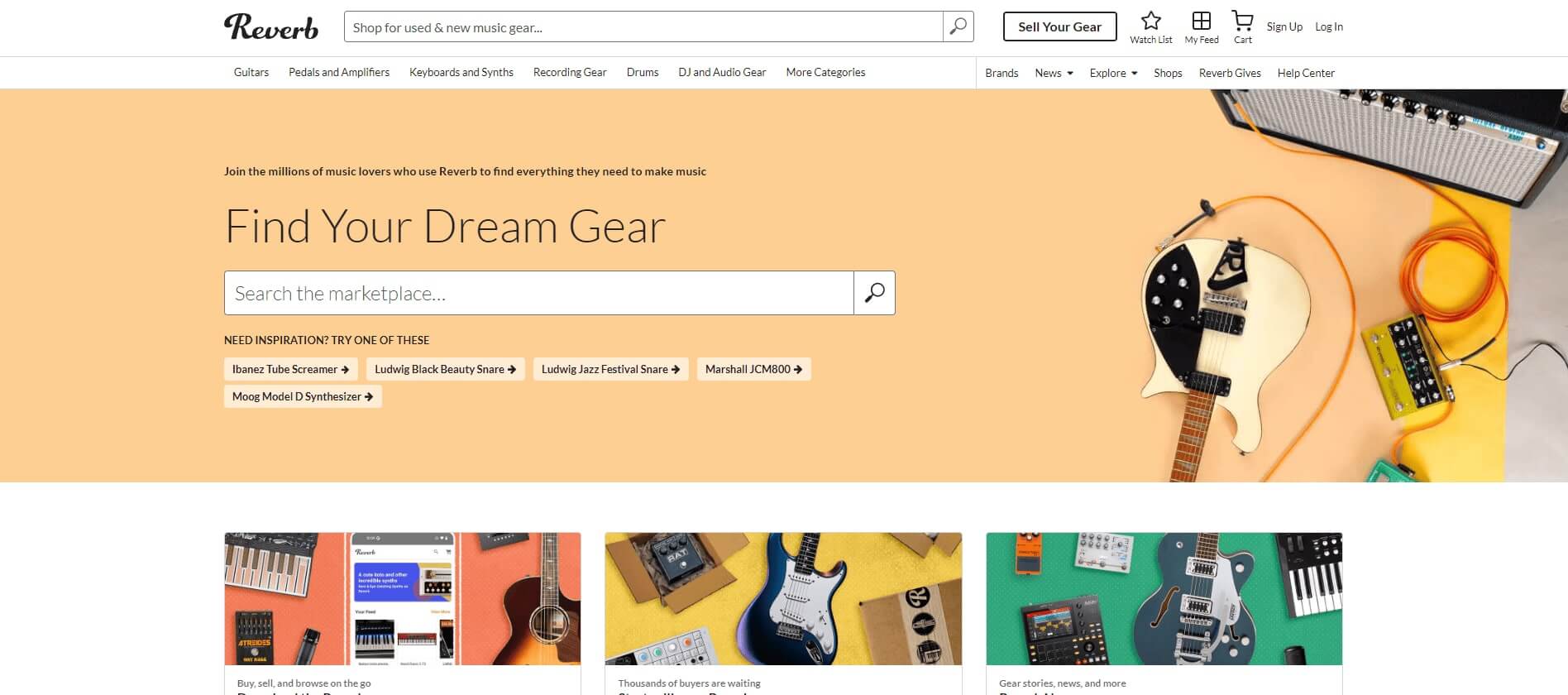
Reverb is an online marketplace that focuses on music gear. Whether it’s instruments, equipment, or accessories, you can find anything related to music on the platform.
You can upload your listings to Reverb for free and the items will be fixed price. They also only charge a 5% fee on each sale – which isn’t too bad considering there are no other hidden commissions.
They have been making efforts to help merchants get more sales by releasing features like Reverb Bump which helps bump your listings in front of potential customers.
The platform is still new so it doesn’t have a large user base. And don’t expect it to grow too big either because it targets a niche audience.
But if you already sell music gear on eBay and are looking for an alternative, then Reverb would be a perfect choice.
Pros
- Only 5% sales commission
- No listing fees allow sellers to maximize their profitsPerfect for selling music gear
Cons
- Small user base
Key Features
- Dedicated platform for musical instruments and equipment, ensuring a targeted audience.
- User-friendly interface that simplifies listing and purchasing processes.
- Integrated tools for pricing transparency and market analysis through a real-time price guide.
- Strong community support with a music-savvy customer service team.
- Mobile apps available for iOS and Android, making it easy to buy and sell on the go.
Best For
Reverb is best suited for musicians, music store owners, and collectors looking to buy or sell musical instruments and gear. It appeals to those who want to reach a niche market of music enthusiasts and professionals who appreciate the value of quality instruments.
Pricing
Reverb’s pricing structure includes:
- No Listing Fees: Sellers can list items without incurring upfront costs.
- Selling Fee: A commission fee of 5% on the final sale price plus a small payment processing fee (around 3%).
While Reverb offers a more specialized platform with lower fees for music gear, its focus on niche products may limit broader sales opportunities.
14) Facebook Marketplace
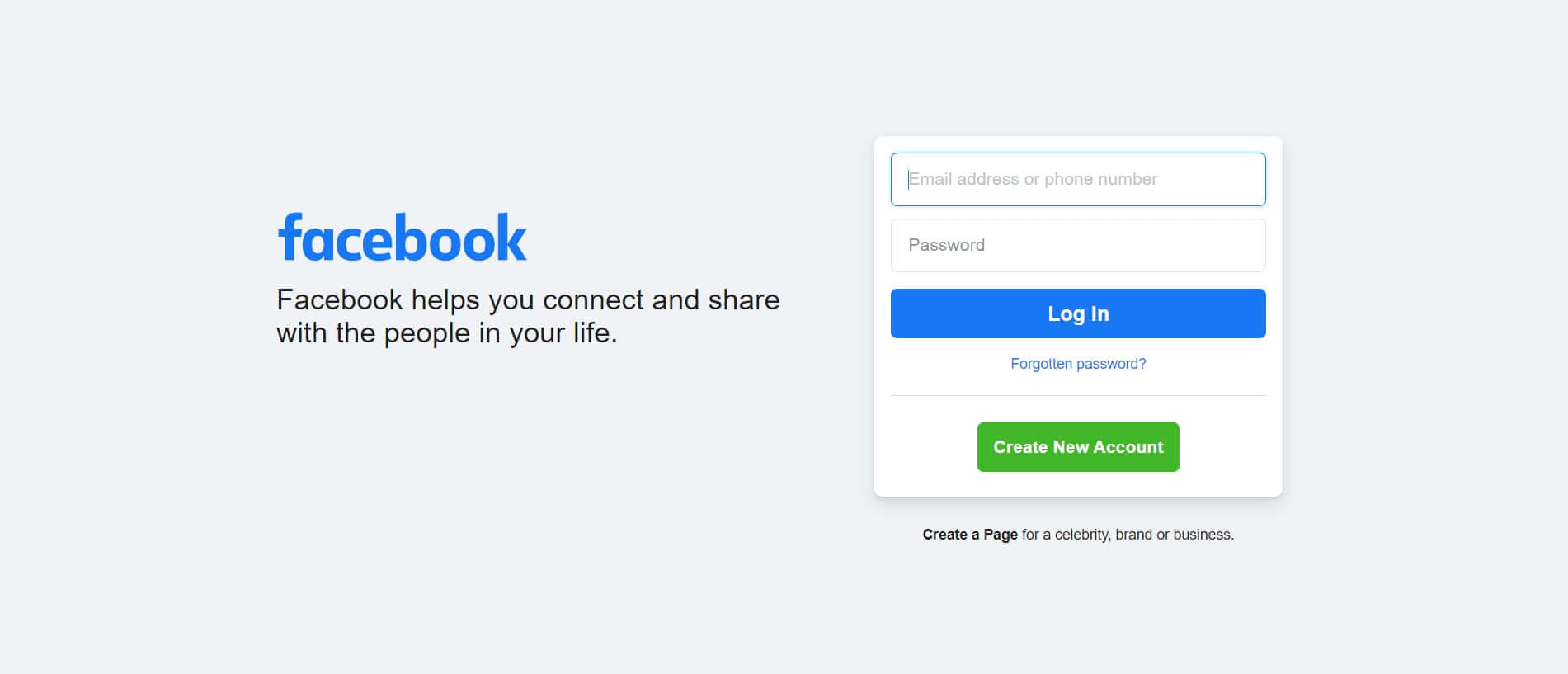
Facebook is the largest social media platform in the world. With more than 2.9 billion active users, you shouldn’t miss the opportunity to sell on its marketplace.
The Facebook marketplace is free to use; the only thing you need to access it is a Facebook account. Listing and selling products are also pretty straightforward and even beginners can do it.
But that’s also the biggest drawback because the marketplace doesn’t have a mechanism for buyer protection. Users need to be extra careful to avoid scams, which in turn can also affect your sales.
Overall, Facebook Marketplace is similar to eBay in the sense that it facilitates both B2C and C2C transactions.
Pros
- Completely free to use
- Largest social media in the world
- Listing and selling products are easy.
Cons
- No buyer’s protection
Key Features
- Free to list items, making it accessible for everyone.
- Direct messaging through Facebook Messenger facilitates easy communication between buyers and sellers.
- Listings appear in users’ News Feeds, increasing visibility.
- Search filters allow buyers to find specific items based on location, price, and category.
- Integrated payment options enable sellers to choose their preferred method (e.g., PayPal, bank transfer).
Best For
Facebook Marketplace is ideal for casual sellers and small businesses looking to reach local customers. It appeals particularly to those who want to sell used items, handmade goods, or services without incurring high fees. The platform is especially popular among younger consumers who are already active on social media.
Pricing
Facebook Marketplace’s pricing structure includes:
- No Listing Fees: Sellers can list items for free.
- Selling Fees: A 5% fee applies to sales over $8; for sales under $8, the fee is $0.40.
15) Target Plus

Target Plus, also known as Target+, is Target’s exclusive online marketplace that allows select third-party sellers to showcase their products on Target.com.
Launched in 2019, this platform taps into Target’s massive customer base, which attracts over 200 million visitors each month.
By focusing on a curated selection of sellers, Target Plus aims to provide a high-quality shopping experience for its customers.
Pros
- You’ll get access to millions of shoppers visiting Target.com every month.
- With fewer sellers in each category, it’s easier to stand out and make sales.
- The simple return process at Target stores makes customers feel more secure when buying.
- Partnering with Target can help you develop effective strategies for selling your products.
Cons
- The application process can be tough; you’ll need to meet certain standards to be invited.
- Not every seller can join right away since it’s an invite-only platform.
- You might face competition from manufacturers who also sell their products on the site.
Key Features
- Only selected sellers can join, ensuring quality products.
- Listings appear alongside Target’s own offerings, making it easy for customers to shop.
- Partner products are prominently featured on Target.com, increasing visibility.
- Customers can return items at any Target store, boosting their confidence in buying.
- Sellers benefit from access to Target’s dedicated shoppers.
Best For
Target Plus is perfect for established brands and retailers that meet Target’s quality standards. If you’re looking to reach a large audience while maintaining a focus on quality, this marketplace could be a great fit. It’s especially ideal for businesses that offer innovative and high-quality products that complement what Target already sells.
Pricing
Target Plus doesn’t charge listing fees, but sellers need to keep their prices consistent across all platforms. There may be specific fees related to fulfillment and other operational costs based on agreements with Target.
16) Wish
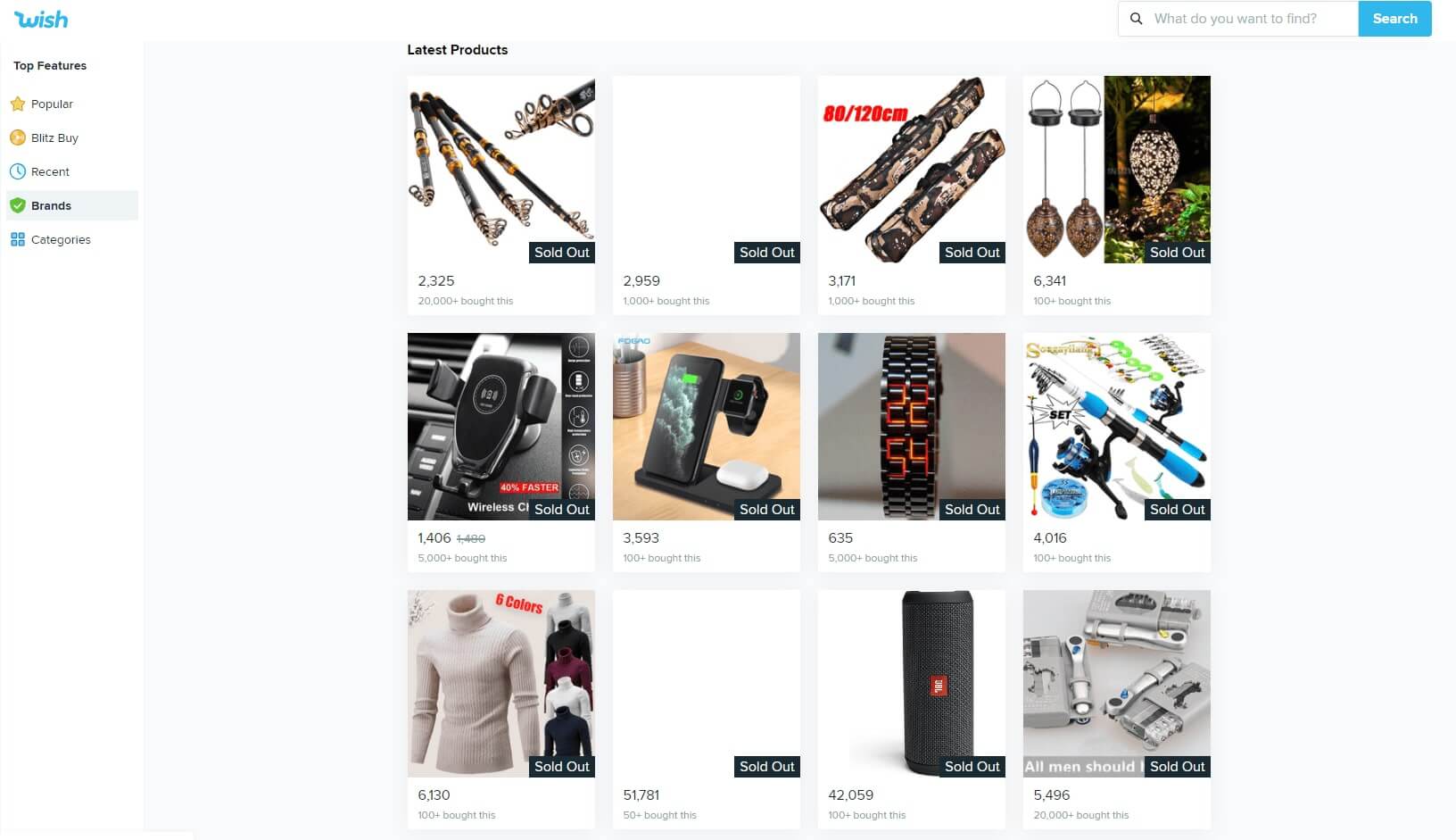
Wish is an online marketplace that deals in a variety of products including electronics, accessories, fashion, and much more.
What makes Wish a viable eBay alternative is its smart algorithm which gives relevant product suggestions to customers based on the data it has collected from wishlists and buying behaviors.
Wish charges a 15% fee when you make a sale – which is honestly a lot, especially for larger businesses that make plenty of sales a day.
But on the bright side, it doesn’t have mandatory monthly subscriptions or hidden commissions so it hardly requires an initial investment.
Pros
- Only charges after you make a sale
- Lesser competition and most people sell unbranded products
Cons
- The platform has faced criticism for issues related to product quality and counterfeit goods
- The recent shift to an invite-only marketplace can make it harder for new sellers to join
Key Features
- Sellers can list their products and access a global audience of potential customers.
- The platform emphasizes low-priced products, making it attractive to bargain hunters.
- Wish operates primarily through a mobile-first approach, with over 90% of sales occurring on its app.
- The shopping experience is designed for discovery, showcasing visually appealing products rather than relying solely on search functionality.
Best For
Wish is ideal for sellers looking to tap into the budget-conscious consumer market. It suits businesses that can offer low-cost items and are willing to navigate the unique challenges of the platform, such as managing shipping times and quality control. It’s particularly beneficial for sellers of fashion, beauty, electronics, and home goods.
Pricing
Wish does not charge listing fees; however, it takes a commission on sales. Sellers should be aware of potential costs related to shipping and fulfillment, especially since many products are shipped from overseas.
The commission structure can vary based on the seller’s agreement with Wish.
17) Nextdoor
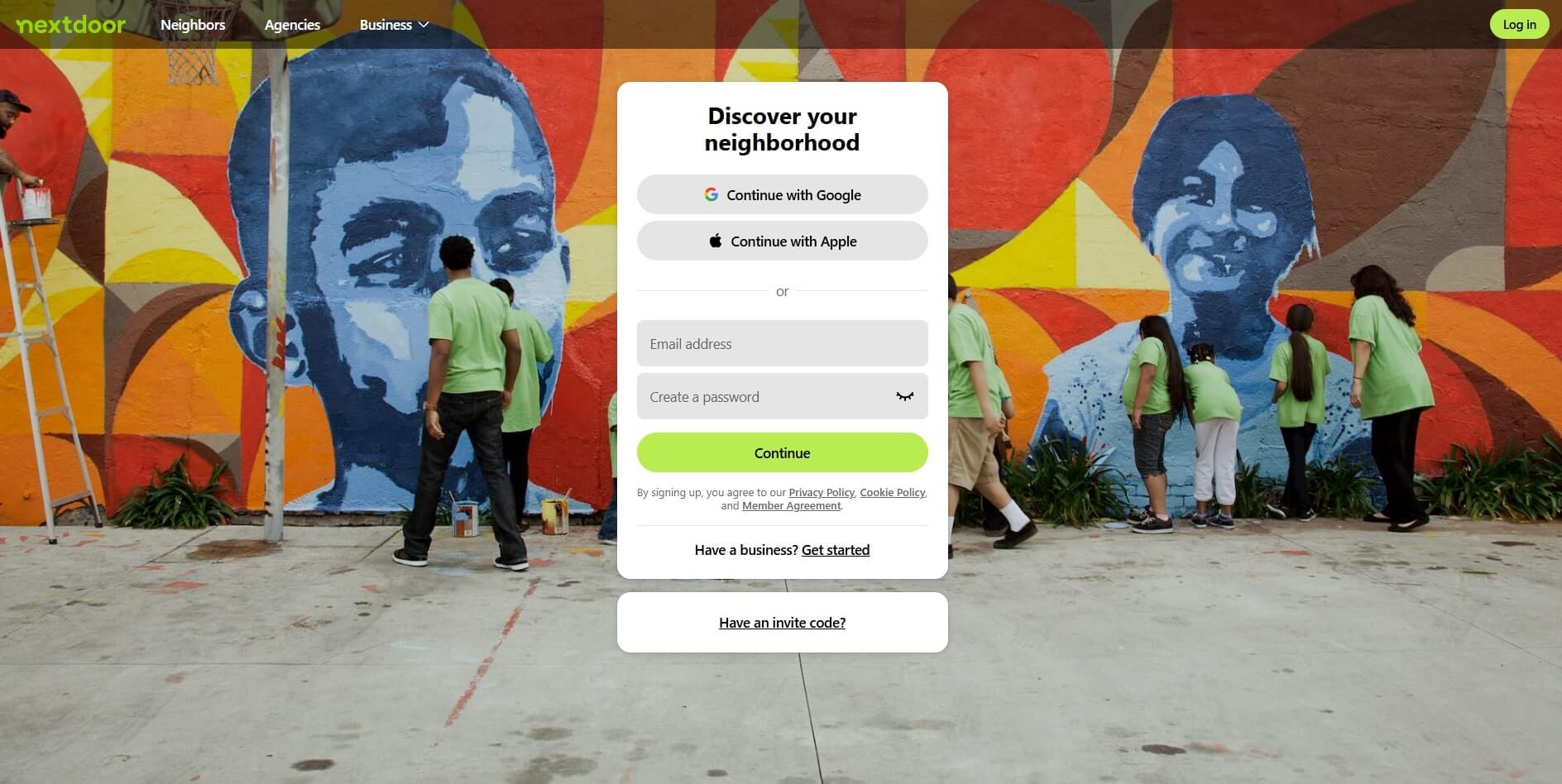
Nextdoor is a friendly social networking platform that connects neighbors and helps build community. Launched in 2011, it allows people to share information, recommendations, and even items for sale within their neighborhoods.
With Nextdoor, you can stay updated on local events, find trusted services nearby, and engage with your community in a meaningful way.
The platform has grown significantly, with marketplace activity exceeding $2 billion in gross merchandise value (GMV) each month.
Pros
- The platform allows for easy buying and selling of items among neighbors.
- Users can receive trusted recommendations for local services and businesses.
- The verification process enhances safety and trust among users.
Cons
- Limited to local transactions, which may restrict the variety of goods available.
- Some users may experience issues with spam or irrelevant posts in their feeds.
- The effectiveness of the marketplace can vary significantly by neighborhood.
Key Features
- Users can post listings in the “For Sale & Free” section to buy or sell items within their community.
- A neighborhood news feed where residents can share updates, safety alerts, and recommendations.
- Local business recommendations that help support and promote nearby entrepreneurs.
- Event planning tools that allow residents to create and RSVP to local gatherings.
- Verification of user addresses to enhance trust and safety among members.
Best For
Nextdoor is ideal for individuals looking to connect with their local community, whether for social interactions, recommendations, or buying and selling items. It’s particularly useful for residents who want to engage with their neighbors, discover local services, and participate in community events.
Pricing
Nextdoor does not charge listing fees for the marketplace; users can freely post items for sale or giveaway. However, businesses may incur costs if they choose to promote their services through paid advertising on the platform.
Why Do You Need an eBay Alternative?
eBay is a powerful online marketplace that connects merchants with buyers from around the globe. You can sell almost anything on the platform, so why in the world would you need an alternative for it anyway?
Well, eBay has significantly scaled over the years and has also brought many changes to its policies that aren’t particularly seller-friendly. This has made merchants seek other alternatives.
Some of the most common complaints that sellers have from eBay are:
1) Biased Policies
The main reason why merchants are looking for an eBay alternative is due to the customer-biased policies of the platform.
eBay prioritizes its customers over the sellers during disputes. Sellers usually have no other option but to accept eBay’s decision.
In the end, it’s mostly the seller who ends up losing money. Although a business should prioritize its customers, a more efficient and fair-dispute-resolution system should also be in place.
2) High Fees and Costs
eBay charges quite a lot of commission in the form of final value and insertion fee. The value of the fee depends on your selling price, niche, and items.
All of these commissions can be difficult to bear for smaller businesses and can quickly slash away their profits.
3) Tough Competition
Standing out on eBay can be challenging because there are probably hundreds of other merchants selling the same product as you.
We know this is the case for most eCommerce marketplaces nowadays. But combine this with the high fee and poor policies of the platform and it becomes clear why some users think the effort isn’t worth it.
FAQs about eBay Alternatives
How to Choose the Best eBay Alternative?
Each platform has its own policies and restrictions, so choosing an eBay alternative mainly depends on what you’re planning to sell.
For instance, if you’re selling handmade products, then Etsy would be the best alternative for you.
However, if you’re sourcing from a third-party manufacturer then you’ll have to go for another platform like Amazon.
So before making the decision, ask yourself whether the platform’s policies align with your business goals.
Is eBay Profitable for Sellers?
The average seller on eBay earns around $35,000 a year while the top-level sellers can rack up to $70,000.
It all boils down to your keyword optimization, customer service, marketing, and product price.
If you can get these things right then the numbers above prove that eBay offers a ton of profit potential.
What Is the Best eBay Alternative for C2C Businesses?
If you’re selling handmade goods, then Etsy is clearly the best eBay alternative for C2C businesses.
But if you’re looking for more freedom in product selection then eBid isn’t a bad choice either.
The only problem with eBid is its small market but other than that, it has all the features necessary to facilitate C2C transactions.
Is the User Base of eBay Getting Smaller?
Yes, eBay’s user base has been declining. As of Q3 2024, eBay reported approximately 133 million active buyers, which reflects a decrease from 135 million in the previous year.
This trend indicates a continued decline in active users since 2018, with a 4.3% drop noted especially from 2022 to 2023.
Why Am I Not Getting Any Sales on eBay?
There could be several reasons for not getting sales on eBay, including:
- Pricing Issues: Your prices may be too high compared to similar listings.
- Listing Quality: Poor photos or descriptions can deter buyers.
- Visibility: If your items are not promoted or lack keywords, they may not appear in search results.
- Market Demand: The items you are selling may not be in high demand at the moment.
How Do Shipping Options on eBay Compare to Other Platforms?
eBay offers various shipping options, including calculated shipping based on buyer location and flat rate shipping.
Many sellers also provide free shipping, which accounts for about 71% of purchases on the platform.
Compared to other platforms like Amazon or Etsy, eBay’s shipping flexibility allows sellers to choose their preferred carriers and methods, making it competitive in terms of logistics
Final Thoughts
There’s no denying that eBay is a powerful marketplace to sell online.
But if you aren’t satisfied with its policies and fees then consider exploring other options.
We have listed plenty of eBay alternatives that might be better for your business.
Scroll through the list and choose a platform that works the best for you.
But regardless of which platform you go for, you will still need to source products for your online business.
This is where NicheDropshipping comes in. We can help you source and customize your desired products at competitive prices.
All you have to do is give us a call, and our agents will happily guide you.
